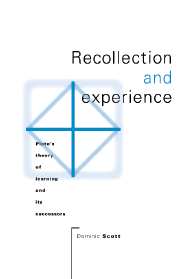Book contents
- Frontmatter
- Contents
- Acknowledgements
- Abbreviations
- GENERAL INTRODUCTION
- SECTION I PLATONIC RECOLLECTION
- SECTION II ARISTOTELIAN EXPERIENCE
- Introduction
- 3 The rejection of innatism
- 4 Levels of learning
- 5 Discovery and continuity in science
- 6 Discovery and continuity in ethics
- Appendix to Section II – Perception of the Universal
- SECTION III HELLENISTIC CONCEPTS
- SECTION IV INNATISM IN THE SEVENTEENTH CENTURY
- CONCLUSION
- Bibliography
- Index of ancient passages
- General index
3 - The rejection of innatism
Published online by Cambridge University Press: 03 December 2009
- Frontmatter
- Contents
- Acknowledgements
- Abbreviations
- GENERAL INTRODUCTION
- SECTION I PLATONIC RECOLLECTION
- SECTION II ARISTOTELIAN EXPERIENCE
- Introduction
- 3 The rejection of innatism
- 4 Levels of learning
- 5 Discovery and continuity in science
- 6 Discovery and continuity in ethics
- Appendix to Section II – Perception of the Universal
- SECTION III HELLENISTIC CONCEPTS
- SECTION IV INNATISM IN THE SEVENTEENTH CENTURY
- CONCLUSION
- Bibliography
- Index of ancient passages
- General index
Summary
VARIETIES OF INNATISM
Aristotle is often seen as an empiricist and as someone who thought that at birth the mind is like a tabula rasa, a blank slate. That he rejected Plato's theory of recollection is clear enough; whether he rejected all other forms of innateness and likened the mind to a tabula rasa is another question. In this chapter, I shall discuss his reasons for rejecting recollection and attempt to answer this further question. As I suggested in the general introduction, however, we have to prepare the philosophical ground carefully before we can determine his position on the innateness issue. In particular, we need a clearer idea of what forms of innatism there may be other than recollection, and also of how to understand the contrast between innatism and empiricism.
We are now considering what it means to say that something is innate to the mind, whereas in the previous two chapters we discussed what level of cognition might be explained by an appeal to innateness. Another set of distinctions that could be made is between the innateness of ideas (or concepts), beliefs and knowledge. Although in some contexts these distinctions are important, in this chapter I shall focus solely on the question of what it is for an item to be innate to the mind whether the item in question is an idea, a belief or knowledge.
According to Plato's variety of innatism, there are items of knowledge in the mind at birth that have also been there in a precarnate state. I now wish to distinguish two other types of innatism which do not assume the pre-existence of the soul.
- Type
- Chapter
- Information
- Recollection and ExperiencePlato's Theory of Learning and its Successors, pp. 91 - 106Publisher: Cambridge University PressPrint publication year: 1995



